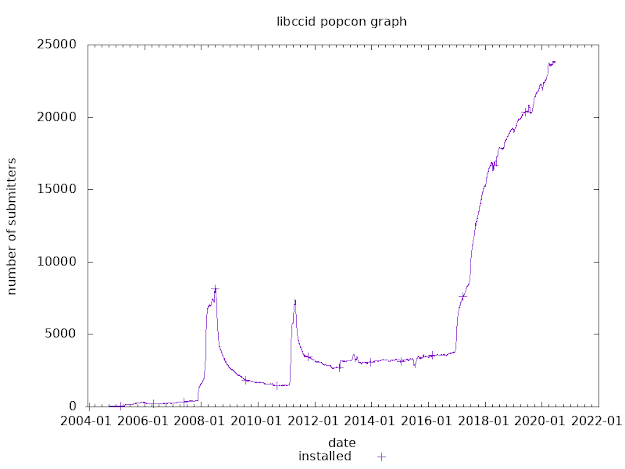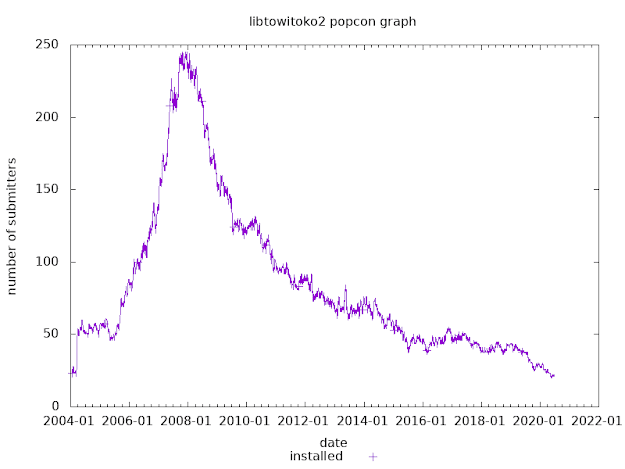Debian uses a system to evaluate the popularity of packages called:
popularity-contest
Each package has a popcon page with the number of installations of the package
and its evolution in time.
popularity-contest
Not every Debian user has the package popularity-contest installed (and enabled). Example with the graph of popularity-contest itself.
The package is installed on 198 548 Debian systems. But we can imagine that
Debian is installed in much more than 200 000 systems.
The popularity-contest package is also available in Ubuntu. The Ubuntu results
are also available. On Ubuntu the
popularity-contest package is installed in 2 796 046 systems. We have a factor
of x14 compared to Debian.
So what is important is not the absolute value of installations but the
evolution in time and the percentages of installed systems.
I was not able to find the graphs for Ubuntu. So I will only use the results
on Debian.
pcsc-lite
popcon page:
https://qa.debian.org/popcon.php?package=pcsc-lite
pcsc-lite software provides 3 packages: the daemon, the library, the
development files. Here we see the 3 packages on the same graph.
libpcsclite1 is, by far, the most installed package. This is because (nearly) all smart card application uses PC/SC and
so depends on libpcsclite1.
| Package | # of installation | % of Debian systems |
| libpcsclite1 | 124551 | 62.63% |
| pcscd | 23796 | 11.96% |
| libpcsclite-dev | 1001 | 0.50% |
On Ubuntu we have:
| Package | # of installation | % of Ubuntu systems |
| libpcsclite1 | 2019980 | 72.2% |
| pcscd | 32834 | 1.17% |
| libpcsclite-dev | 9494 | 0.34% |
libpcsclite1
The number of installations of libpcsclite1 is much higher than the number of installation of pcscd. But libpcsclite1 is useless without pcscd.
This is because libpcsclite1 is a dependency of some packages that provides a
smart card support but not every user is using it. For example
wpasupplicant
depends on libpcsclite1 but not every users of wpasupplicant are using a smart card.
pcscd
The two spikes occurred when I changed the dependency between libpcsclite1 and
pcscd. When libpcsclite1 depends on pcscd then each installation of
libpcsclite1 will also install pcscd. See Debian bugs
#476483
and
#612971.
After I solved the 2 bugs the level went down.
The rise that starts in 2017 should indicate a real use of smart card since
that date. That is a good sign.
From the 2 tables above we can notice that pcscd is installed in x10 more Debian systems (11.96%) than Ubuntu systems (1.17%).
My interpretation is that Debian users are more security conscious and use more smart cards than Ubuntu users.
libpcsclite-dev
This package is needed only if you want to build applications using PC/SC. It is
expect to have a number of installation far lower than the number of pcscd installations.
Smart card drivers
On Debian, smart card drivers should each provide the virtual package:
pcsc-ifd-handler
| Package | # installations | "market share" |
| libccid | 23791 | 96.06% |
| libacsccid1 | 483 | 1.95% |
| libifd-cyberjack6 | 282 | 1.14% |
| libasedrive-usb | 68 | 0.27% |
| libgempc430 | 54 | 0.22% |
| libgcr410 |
29 | 0.12% |
| libasedrive-serial | 23 | 0.09% |
| libtowitoko2 | 22 | 0.09% |
| libgempc410 | 15 | 0.06% |
libccid
CCID is the USB standard for USB smart card readers.
It is also the default driver installed with pcscd. It is then expected that
the pcscd and libccid graphs are quiet similar.
libacsccid1
The libacsccid1 driver is a (friendly) fork of my libccid driver adapted to
some ACS readers.
libifd-cyberjack6
This driver is for REINER SCT cyberJack USB chipcard readers.
libasedrive
This driver is for Athena ASEDrive IIIe serial and USB devices.
GemPC 410 & 430
I am also the upstream maintainer of 2 other drivers:
- libgempc410 is a driver for the Gemplus GemPC 41x serial readers.
- libgempc430 is a driver for the Gemplus GemPC 43x USB readers.
I am surprised to see systems with these drivers installed. I have not used them myself
since ages.
libgcr410
This driver is for Gemplus GCR410 serial device.
libtowitoko2
This driver is for Towitoko smartcard reader PCSC and CT-API driver.
Conclusion
Around 12% of Debian users are using smart cards. I would not have expected so much.
The percentage on Ubuntu, 1%, is (I imagine) more representative of the general population.















